|
Shaping Effective
National Training Programs
By Rod and Sherry Boyd
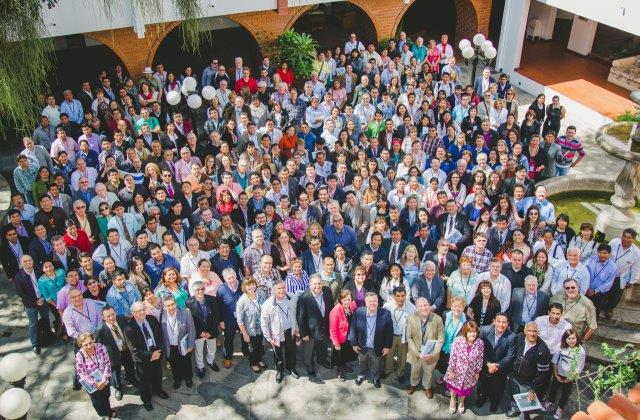
2016 International Educators Summit - Santa
Cruz, Bolivia
Full resolution photo
In a span of three weeks, we had the privilege of
participating in two influential training events. August 22-25 we conducted
the 2016 International Educators Summit in Santa Cruz, Bolivia. We organize two of
these every two years. One is conducted in a Central American country that
is directed to Central America, Caribbean Spanish-speaking countries, Mexico
and Hispanic educators in the United States. The other is conducted in South
America. September 9-10 we were invited to conduct PROCEPA workshops at the
2016 National Christian Education Congress in Quito, Ecuador.
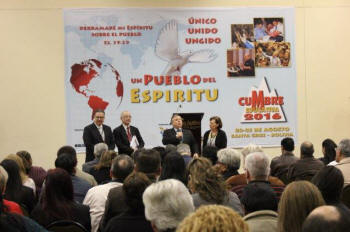 We are grateful to the Lord for these opportunities to
shape effective national training programs that altogether represent more
than 1,000 Bible schools, extension and ministry training centers, with
6,000 volunteer pastors and leaders who are teaching 43,000 ministers in
training. This brief article will provide a report of each of these two
events, how they contribute to the development of effective training
programs in the countries served and three important principles that we’ve
discovered in our years of involvement in raising up Christian leaders in
Panama and throughout the Spanish-speaking Latin America / Caribbean region. We are grateful to the Lord for these opportunities to
shape effective national training programs that altogether represent more
than 1,000 Bible schools, extension and ministry training centers, with
6,000 volunteer pastors and leaders who are teaching 43,000 ministers in
training. This brief article will provide a report of each of these two
events, how they contribute to the development of effective training
programs in the countries served and three important principles that we’ve
discovered in our years of involvement in raising up Christian leaders in
Panama and throughout the Spanish-speaking Latin America / Caribbean region.
2016 International Educators Summit
Aug. 22-25, Santa Cruz, Bolivia
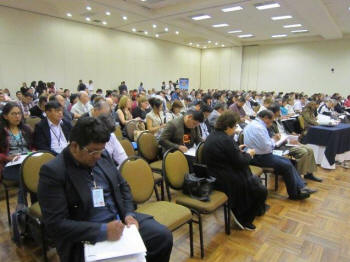 There were a total of 375 leaders and educators who
attend from 15 countries. More than 40 of these were involved in the
teaching program that included ten general sessions and 35 workshops
offered. As with the Educators Summit conducted in Panama in April, our
theme was A People of the Spirit. Each of the ten general sessions
contributed to this unified message with three sub-points: a UNIQUE people
of the Spirit, UNITED and ANOINTED by the Spirit. The Holy Spirit faithfully
visited us in the different sessions and services, with a very special move
during the final morning. There were a total of 375 leaders and educators who
attend from 15 countries. More than 40 of these were involved in the
teaching program that included ten general sessions and 35 workshops
offered. As with the Educators Summit conducted in Panama in April, our
theme was A People of the Spirit. Each of the ten general sessions
contributed to this unified message with three sub-points: a UNIQUE people
of the Spirit, UNITED and ANOINTED by the Spirit. The Holy Spirit faithfully
visited us in the different sessions and services, with a very special move
during the final morning.
Each Educators Summit involves several months of
intensive planning and preparation that starts more than a year in advance
with naming a local committee to coordinate logistics related to local
transportation, housing, food, hotel, printing, materials and local
promotion and registration. The local committee did a fabulous job that
resulted in having 229 attend from Bolivia.
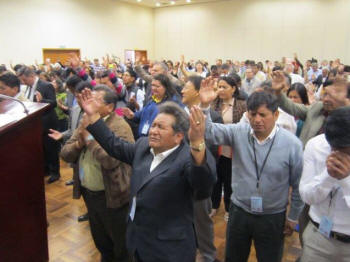 We try to maintain
an atmosphere of both inspiration and celebration
in the Summits. There is an equal emphasis on training, where those that
attend have the opportunity to begin or continue their PROCEPA teacher
certification. Our desire is that each one who attends return to their
ministry motivated and equipped. In addition, we strongly believe that the
six National Superintendents, five National Christian Education Directors,
several international educational leaders and scores of local Bible school
directors and teachers will influence many, many more! We try to maintain
an atmosphere of both inspiration and celebration
in the Summits. There is an equal emphasis on training, where those that
attend have the opportunity to begin or continue their PROCEPA teacher
certification. Our desire is that each one who attends return to their
ministry motivated and equipped. In addition, we strongly believe that the
six National Superintendents, five National Christian Education Directors,
several international educational leaders and scores of local Bible school
directors and teachers will influence many, many more!
Our most strategic meeting was with members of the
Bolivian National Christian Education Committee after the final service. Our
leadership team listened to them share the needs of the local program and
their belief that the Educators Summit was going to help them implement
important reforms to make their program more effective. We are in the
process of scheduling a return to Bolivia for the first quarter of 2017 to
continue their PROCEPA teacher certification and conduct a National
Strategic Dialogue and help them to implement the auto evaluation step, the
initial step to earn accreditation for their Bible schools.
2016 National Christian Education Congress
Sept. 9-10, Quito, Ecuador
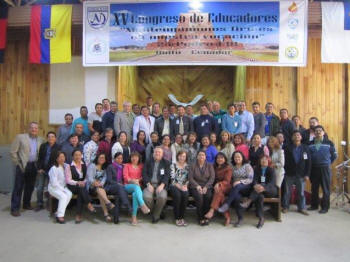 A total of 60 Bible School Directors and Professors
attended the 2016 Congress. Sherry and I were invited to teach two PROCEPA
workshops and prepare the certificates for those beginning their program.
There was also strong interest to enroll in the Assemblies of God
Theological Association with 31 of those in attendance become members. The
PROCEPA training accompanies their formal academic training that qualifies
them as professors. The theological association membership helps them know
how qualified they are and serves as an excellent motivation for them to
continue their education. A total of 60 Bible School Directors and Professors
attended the 2016 Congress. Sherry and I were invited to teach two PROCEPA
workshops and prepare the certificates for those beginning their program.
There was also strong interest to enroll in the Assemblies of God
Theological Association with 31 of those in attendance become members. The
PROCEPA training accompanies their formal academic training that qualifies
them as professors. The theological association membership helps them know
how qualified they are and serves as an excellent motivation for them to
continue their education.
I (Rod) happened to be celebrating a birthday during the
Congress, so Eugenio Diaz, the National Christian Education Director, took
Sherry and me out for dinner to celebrate. Once again, this informal meeting
with the Ecuador national director turned out to be our most strategic, one
that included conversation about the next steps that the Ecuador can take to
improve their program.
Three important lessons we’ve learned...
These two events that included two strategic meetings
with national leaders, we were reminded of three underlying principles that
seem to always be present in strong training programs:
1. Strategic link between training and
credentialing. National churches with strong training programs are
those that strategically chose to assume responsibility for training
ministers in their country to serve as pastors, evangelists and missionaries
and require that training for ministerial credentials. For example, there
are four levels of ministerial credentials in Panama: Local Worker,
Christian Worker, Licensed and Ordained. The first credential is provisional
that requires a stated intent to begin Bible school studies. The second
requires some Bible school. The third traditionally has required two years.
And in order to be ordained, the candidate must be a diploma graduate with
96 credits. Without this strategic link, it’s nearly impossible to sustain
an effective program.
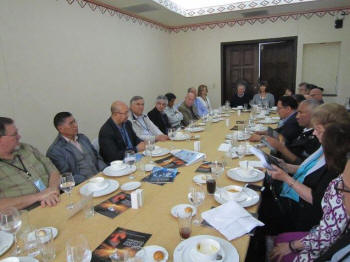 2. Strong national vision and leadership.
Strong national vision and leadership is required in order to standardize
curriculum and establish and coordinate other criteria. Without this
critical component, each director and school will do what’s right in its own
eye, often following paths of lesser resistance and popular societal trends.
It was in a special South American version of our International Dialogue,
conducted in 2008 in Santiago, Chile that superintendents and national
directors identified this as one of the top three needs for their countries. 2. Strong national vision and leadership.
Strong national vision and leadership is required in order to standardize
curriculum and establish and coordinate other criteria. Without this
critical component, each director and school will do what’s right in its own
eye, often following paths of lesser resistance and popular societal trends.
It was in a special South American version of our International Dialogue,
conducted in 2008 in Santiago, Chile that superintendents and national
directors identified this as one of the top three needs for their countries.
3. Sustained commitment to quality.
Strong national training programs nearly always are committed to quality.
The first International Educational Leaders Dialogue was held in Panama in
2001. Of the four priorities identified by the 20 leaders from 10 countries,
two of them related to the need for sustaining quality in program: The need
for an international system of educational standards and for both internal
and external accreditation for achieving those standards. The Assemblies of
God Theological Association was formed in 2003. It took some time to
organize and activate it, but with the impulse of the PROCEPA teacher
certification program in 2008, we now have more than 5,000 teachers who have
begun the program, with nearly 1,000 having completed the basic
certification level. We are just now implementing the auto evaluation stage
for countries that will eventually lead to the accreditation of their Bible
Schools.
We say thank you to the Lord and to each of our
supporters for allowing us the immense privilege of influencing a whole
continent towards effective ministerial training. Your generosity has
allowed us to minister unhindered. Together we are multiplying ministry by
training thousands of harvest workers.
|